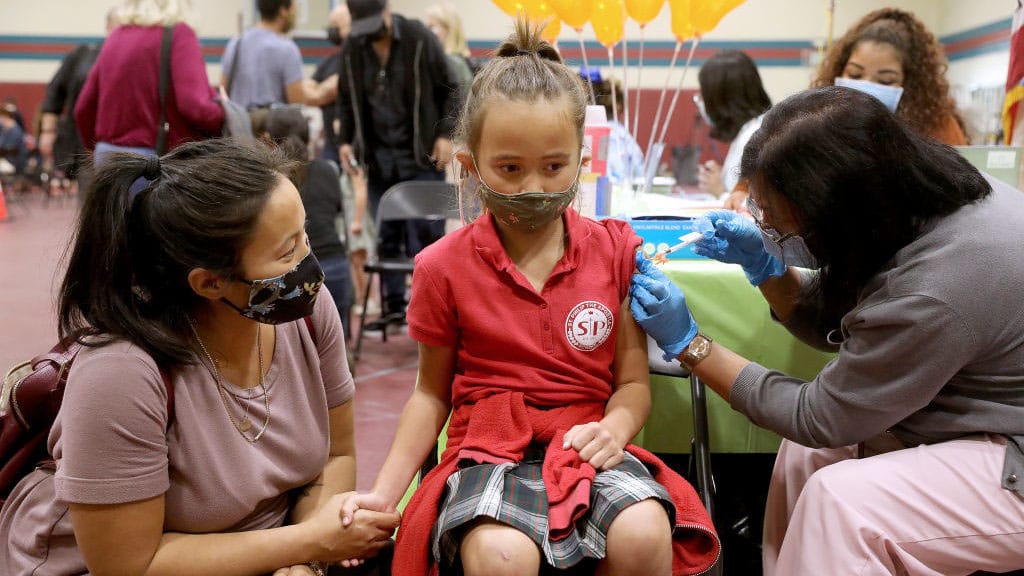 Six-year-old Adeline Fahey, supported by her mother Nicole Fahey of Altadena, California, receives a child’s dose of the Pfizer vaccine against the coronavirus from RN Shirley Alfonso at Eugene A. Obregon Park on Wednesday, November 3, 2021 in Los Angeles. (Gary Coronado / Los Angeles Times via Getty Images)
Six-year-old Adeline Fahey, supported by her mother Nicole Fahey of Altadena, California, receives a child’s dose of the Pfizer vaccine against the coronavirus from RN Shirley Alfonso at Eugene A. Obregon Park on Wednesday, November 3, 2021 in Los Angeles. (Gary Coronado / Los Angeles Times via Getty Images)
Some Gulf countries have granted emergency approval to use the Pfizer vaccine against the coronavirus for children ages 5-11. Meanwhile, a panel of experts from Israel’s Health Ministry began meeting to discuss and vote on vaccinating children.
The decisions come after the US Centers for Disease Control and Prevention on Tuesday voted to recommend the Pfizer vaccine for children ages 5-11. The US Food and Drug Administration authorized the Pfizer vaccine on Friday.
“In clinical trials, vaccination was found to be nearly 91% effective in preventing COVID-19 among children ages 5 to 11. In clinical trials, vaccine side effects were mild, self-limiting. The most common side effect was a sore arm,” CDC director Dr. Rochelle Walensky said during a news conference.
“Together, with science leading the charge, we have taken another important step forward in our nation’s fight against the virus that causes COVID-19. We know millions of parents are eager to get their children vaccinated and with this decision, we now have recommended that about 28 million children receive a COVID-19 vaccine. As a mom, I encourage parents with questions to talk to their pediatrician, school nurse or local pharmacist to learn more about the vaccine and the importance of getting their children vaccinated,” Walensky said in a statement.
Children in some places in the United States began receiving their vaccinations on Wednesday. Distribution of pediatric vaccinations across the United States started this week, with plans to scale up to full capacity starting the week of November 8.
The vaccine dose for children ages 5-11 is two inoculations of 10 micrograms administered 21 days apart, instead of the 30-microgram dose administered to adults. This is the “preferred dose for safety, tolerability and immunogenicity in children 5 to 11 years of age,” Pfizer said in a statement.
The Coronavirus Pandemic Response Team, which advises Israel’s Health Ministry, on Thursday began a public session on giving vaccines against the coronavirus to children ages 5-11. As part of the meeting, which was streamed live on several platforms, members presented information regarding the efficacy and other medical aspects of the vaccine, they were also set to address questions sent in by the public. Twenty members of the public also were to be given the opportunity to speak for three minutes, including those against the idea of giving children a vaccine against the coronavirus.
The panel was not planning to make a final decision during the public session on Thursday.
Bahrain on Tuesday granted emergency approval to use the Pfizer vaccine against the coronavirus for children ages 5-11. The country will receive doses in the appropriate amount for children beginning in 2022, Reuters first reported, citing the Bahraini government. The kingdom last week approved the use of the Sinopharm vaccine for children ages 3-11.
Saudi Arabia’s Food and Drug Authority on Wednesday announced its approval of the Pfizer coronavirus vaccine for children between the ages of 5-11. The authority said that the vaccine “met the special regulatory requirements.”
Moderna on Monday announced that interim data from the Phase 2/3 study of its coronavirus vaccine in children ages 6 to 11, at half the adult dose, showed “a robust neutralizing antibody response … with a favorable safety profile.” It has not yet asked for emergency use approval.
Here are the latest COVID-19 numbers for the Middle East and North Africa as of 6:30 a.m. Greenwich Mean Time (UTC±0) on Thursday.
Country |
Confirmed Cases | Deaths | Recovered | Active Cases |
| Afghanistan | 156,323 | 7,284 | 128,848 | 20,191 |
| Algeria | 206,754 | 5,931 | 141,889 | 58,934 |
| Bahrain | 276,956 | 1,393 | 275,183 | 380 |
| Cyprus | 123,439 | 576 | 90,755 | 32,108 |
| Djibouti | 13,487 | 183 | 13,259 | 45 |
| Egypt | 333,840 | 18,832 | 280,562 | 34,446 |
| Iran | 5,954,962 | 126,763 | 5,547,349 | 280,850 |
| Iraq | 2,058,914 | 23,248 | 2,008,082 | 27,584 |
| Israel | 1,332,247 | 8,109 | 1,316,968 | 7,170 |
| Jordan | 868,493 | 11,077 | 834,956 | 22,460 |
| Kuwait | 412,752 | 2,462 | 409,957 | 333 |
| Lebanon | 643,749 | 8,522 | 617,676 | 17,551 |
| Libya | 359,019 | 5,157 | 301,835 | 52,027 |
| Mauritania | 37,489 | 799 | 36,041 | 649 |
| Morocco | 946,766 | 14,689 | 927,745 | 4,332 |
| Oman | 304,318 | 4,112 | 299,670 | 536 |
| Pakistan | 1,275,158 | 28,496 | 1,224,085 | 22,577 |
| Palestinian Territories | 424,443 | 4,429 | 415,413 | 4,601 |
| Qatar | 239,646 | 611 | 237,739 | 1,296 |
| Saudi Arabia | 548,760 | 8,799 | 537,690 | 2,271 |
| Somalia | 21,269 | 1,180 | 9,927 | 10,162 |
| Sudan | 40,238 | 3,099 | 32,905 | 4,234 |
| Syria | 44,191 | 2,590 | 26,652 | 14,949 |
| Tunisia | 712,982 | 25,254 | 686,505 | 1,223 |
| Turkey | 8,121,226 | 71,298 | 7,582,624 | 467,304 |
| United Arab Emirates | 740,136 | 2,137 | 734,450 | 3,549 |
| Yemen | 9,810 | 1,897 | 6,463 | 1,450 |
| Total | 26,207,367 | 388,927 | 24,725,228 | 1,093,212 |
Ben Zabelshansky contributed to this report.























 More news and opinions than at a Shabbat dinner, right in your inbox.
More news and opinions than at a Shabbat dinner, right in your inbox.